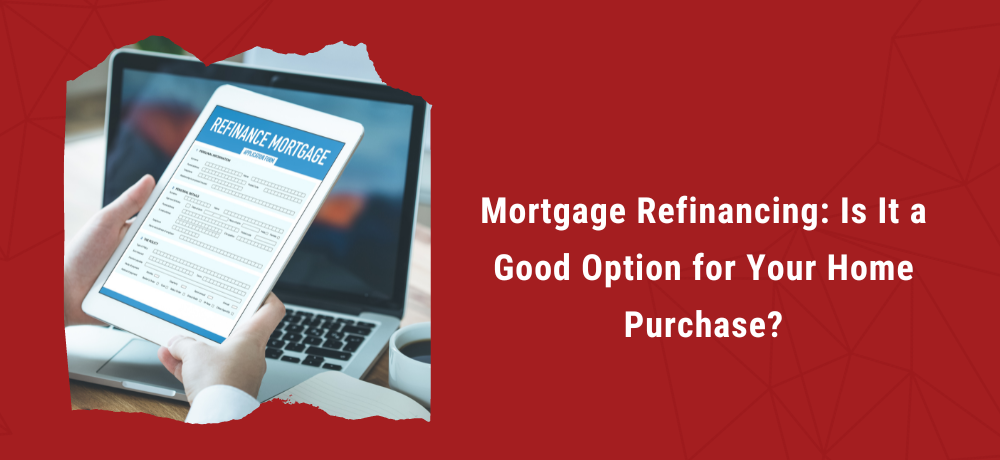Mortgage Refinancing: Is It a Good Option for Your Home Purchase?

Mortgage refinancing is a financial strategy that has the potential to save homeowners money, improve their financial situations, and even open doors to new opportunities. However, the decision to refinance a mortgage is not one to be taken lightly. In this blog post, we will explore the concept of mortgage refinancing and discuss the factors you should consider to determine if it's a good option for your home purchase.
Understanding Mortgage Refinancing
What is Mortgage Refinancing
Mortgage refinancing is the process of taking out a new loan to replace your existing mortgage. This new loan typically comes with different terms, such as interest rates and repayment schedules.
Common Reasons for Refinancing
Common reasons for refinancing loans include lowering interest rates to reduce monthly payments, accessing equity for major expenses or debt consolidation, and changing loan terms to better align with a borrower's financial goals or circumstances. Refinancing is a financial strategy used to optimize existing loan arrangements and can offer potential savings and flexibility.
The Benefits of Mortgage Refinancing
Lowering Monthly Payments
Lowering monthly payments typically involves restructuring a loan to extend its term, reduce the interest rate, or both. This can provide borrowers with more manageable and budget-friendly payments, making it easier to meet their financial obligations and improve their overall cash flow. However, it's important to consider the long-term cost and potential implications of lower monthly payments when refinancing.
Reducing Interest Costs
Understand how securing a lower interest rate can result in substantial savings over the life of the loan. Reducing interest costs through refinancing often involves obtaining a new loan with a lower interest rate than the original one. This strategy can result in significant savings over the life of the loan, making it a cost-effective choice for borrowers with improved credit or favorable market conditions.
Accessing Home Equity
Learn how cash-out refinancing can allow homeowners to tap into their home's equity for various purposes, such as debt consolidation or home improvements. Accessing home equity involves refinancing a mortgage to tap into the accumulated value of one's home. This allows homeowners to borrow against the equity for various purposes, such as home improvements, debt consolidation, or major expenses, leveraging the property's value as collateral for the loan.
Considerations Before Refinancing
Creditworthiness
Creditworthiness refers to an individual's or entity's ability and reliability in repaying borrowed money. Lenders and financial institutions assess creditworthiness by examining factors like credit history, income, debt levels, and overall financial stability to determine the risk associated with extending credit. A strong creditworthiness often leads to more favorable lending terms, while poor creditworthiness can result in higher interest rates or loan denials.
Equity and Loan-to-Value (LTV) Ratio
Equity represents the ownership value that a borrower has in an asset, typically a property, and is calculated by subtracting the outstanding loan balance from the property's market value. The Loan-to-Value (LTV) ratio, on the other hand, quantifies the percentage of the property's value that is financed through a loan, and a lower LTV ratio indicates a greater share of equity in the asset.
Closing Costs
Closing costs are the fees and expenses incurred during the final stages of a real estate transaction when the property's ownership is transferred from the seller to the buyer. These costs typically include fees for services like appraisal, title search, lender fees, and legal fees, as well as prepayments for property taxes and insurance. Understanding and budgeting for closing costs is essential for both buyers and sellers, as they can significantly impact the overall cost of the transaction.
Potential Risks and Drawbacks
Extended Loan Terms
Extended loan terms involve lengthening the duration of a loan repayment schedule, which can lead to lower monthly payments but often result in higher overall interest costs. Borrowers may opt for extended terms to make their loans more affordable, but they should consider the trade-off between lower monthly payments and the total amount paid over the life of the loan.
Qualification Challenges
Qualification challenges can arise during the loan application process, such as difficulties meeting credit requirements, providing sufficient income documentation, or meeting specific lender criteria. These challenges can affect a borrower's ability to secure a loan and may necessitate improvements in creditworthiness or financial stability to meet lender requirements.
Fluctuating Interest Rates
Fluctuating interest rates refer to the constant changes in the cost of borrowing money, which can impact the affordability of loans. Borrowers in variable or adjustable-rate loans may experience varying monthly payments as interest rates shift, making it essential to anticipate and plan for potential rate fluctuations to avoid financial strain. It's crucial to understand the terms and potential adjustments when considering loans with fluctuating interest rates.
Mortgage refinancing can be a valuable financial tool for homeowners, but it requires careful consideration and expert guidance. To determine if it's a good option for your home purchase, assess your goals, financial situation, and the current market conditions. If you're looking for mortgage refinancing, contact Anchor Mortgages Canada LTD. for expert advice and personalized solutions. Our team in Abbotsford, British Columbia, is dedicated to finding the right mortgage solutions for your unique needs. Make an informed decision and ensure that your mortgage works for you.
Get in touch with us today
To learn more about what we do, please click here. To contact us, please click here or call us at (778) 880-2345.